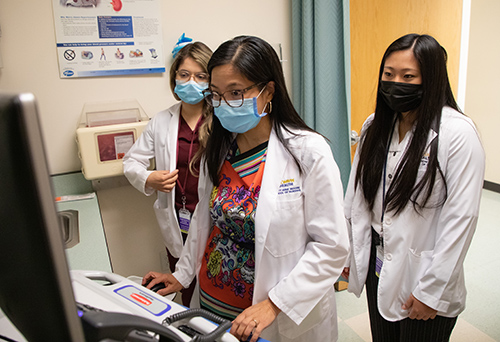Fighting for the haves and have nots
School of Nursing educator advocates for patients, mentors students and pursues terminal degree

Chris de Belen-Wilson, center, a clinician educator at the Betty Irene Moore School of Nursing at UC Davis, mentors two students at the Sacramento County Health Clinic, where she also provides care as a family nurse practitioner.
Despite 20 years in clinical practice, Chris de Belen-Wilson has never lost her quest for knowledge or desire to impact change. So, she embarked on a Doctor of Nursing Practice (DNP) degree to take her perspective to an even higher level.
“After a few years into my family nurse practitioner practice, I cared for patients with the same problem over and over. I realized that the problem is really what's happening outside the clinic,” she explained. “That’s where the DNP program comes into place.”
de Belen-Wilson’s heart is to serve. From her early days as a registered nurse in acute care and community health to her current routine at the Sacramento County Health Center, she works to right injustices in marginalized communities.
Chris de Belen-Wilson explains why she seeks a Doctor of Nursing Practice Degree.
“I have worked with the haves and the have nots. When you have a heart to take care of a population with such minimal resources, you fight for the underdogs,” de Belen-Wilson said.
When working in Jamaica with the U.S. Peace Corps, she changed her personal outlook on community health and professional trajectory in the nursing profession.
“I worked with the family practice physician in a local community. As I saw how we managed care and built relationships, I realized how community shaped the health of individual patients,” she explained.
She earned a Master of Science — Family Nurse Practitioner (FNP) Degree and began her practice at a county clinic and a mobile clinic, where she provided for migrant farm workers, jail inmates and prenatal patients.
Now, 15 years later, de Belen-Wilson serves people from marginalized communities at the county clinic. In addition, as a clinician educator at the Betty Irene Moore School of Nursing at UC Davis, she also precepts and mentors FNP and physician assistant students.
“As a nurse practitioner, now you're managing the totality of the patient's care,” de Belen-Wilson said. “It is really up to you to make decisions that take the whole gamut of what's happening with your patient — not only within their body and mind, but also what's happening outside.”
That mystery of what’s happening outside the clinical setting drove de Belen-Wilson to pursue the DNP.
“How do you go beyond the four walls in this relationship and expand it outside to the community and the systems that affect health? What kinds of resources or programs can we implement, like building interprofessional teams to support social determinants of health? Then making sure they have access to those services and to care. That’s what a DNP perspective delivers.”
De Belen-Wilson hopes to practice in the clinical setting and translate evidence-based knowledge into her setting..A DNP degree also prepares her for that role.
“As a DNP student, all these light bulbs are lighting up in my brain. I’m thinking, this would be such a great partnership with a PhD-based clinician. It creates synergies between the two terminal degrees,” she said. “I also knew that my heart is in patient care. I don’t want to be removed from that in any capacity. A DNP is completely perfect.”
Perfect for clinicians with a heart to care for people and a head to enact change in communities. Those are also the goals of the School of Nursing’s proposed post-baccalaureate Doctor of Nursing Practice — Family Nurse Practitioner (DNP-FNP) degree program to prepare new family nurse practitioners.
“I think the DNP, as a profession, helps to not only legitimize what we do, but enables us to be influencers in health care to optimize systems and shape policy,” she said. “I'm hoping that folks who have the DNP really learn how to create system change, influence health care so that leaders are listening. And that we're at the table making those changes and advocating for those who don't have.”





